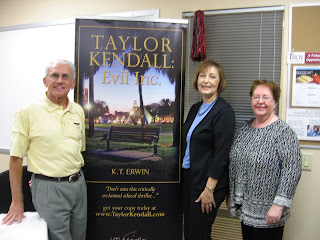Afformation - that's not a spelling error, it's "the write twist" with a fresh approach to motivation. One of my daily must-read emails is Michael Masterson's
Early to Rise newsletter. While this is business oriented, the articles and ideas adapt to many types of work including writing.
Noah St John's article explaining Afformations caught my attention. How many times have you heard about the usefulness of positive affirmations? Have you made it consistently work for you? Too often these ideas get lost in the daily routine or the vigor of the idea wanes days after attending a motivational seminar.
This is the genius of St John's idea: Afformations are not what you want to gain, but rather what you want to increase in your life. Read his article for full details. I am going to adapt his concept to a writer's example:
Typical Affirmation: I am writing a book to present to a publisher this year.
In the background your "critical editor" voice says, "Yeah, heard that last year and the year before and nothing has been finished. What's different this time?"
Your brain gets busy attempting to refute the Critical Editor. In the process, you are focused on the past, lack of performance and defending yourself. Negative energy is wasted energy.
Afformations work with you, not against you. Here's the difference:
Afformation: How did I finish my book ahead of schedule with ease?
Now your brain focuses on how effectively you accomplish the goal without questioning whether the task will or will not be completed. Is this a lot of mumbo-jumbo? No. As a Clinical Psychotherapist I can say with confidence that the brain works better dealing with positives than with negatives. Additionally, speaking in the positive neutralizes the “Critical Editor” (that’s actually a psychological concept, not only for writers).
Having attended and taught many motivational programs, I felt like I heard it all until reading this morning’s Early to Rise. Noah St John’s approach to Afformations excites me and I hope you will put these to work for super-charge your writing productivity.
P.S. I highly recommend signing up for the free subscription to Early to Rise newsletter.
 Here's one step I took in less than twenty minutes by creating products with my book image and promo line on Cafe Press. To my surprise it was a simple process, blessedly requiring no graphic arts or HTML skills. Now it's up to me to include this link on all my sites and potential selling sources. I also plan to purchase the "official" Taylor Kendall Evil Inc Tote to bring with me for book signings and other author promotion events.
Here's one step I took in less than twenty minutes by creating products with my book image and promo line on Cafe Press. To my surprise it was a simple process, blessedly requiring no graphic arts or HTML skills. Now it's up to me to include this link on all my sites and potential selling sources. I also plan to purchase the "official" Taylor Kendall Evil Inc Tote to bring with me for book signings and other author promotion events. What makes these branded products enticing is the promo line. . . "Help us spread Evil". That makes you take a second look in the same way that my Health Coaching tee with my Before and After (70 lbs lost) photos are a walking billboard which often starts conversations that lead to new coaching relationships.
What makes these branded products enticing is the promo line. . . "Help us spread Evil". That makes you take a second look in the same way that my Health Coaching tee with my Before and After (70 lbs lost) photos are a walking billboard which often starts conversations that lead to new coaching relationships.

